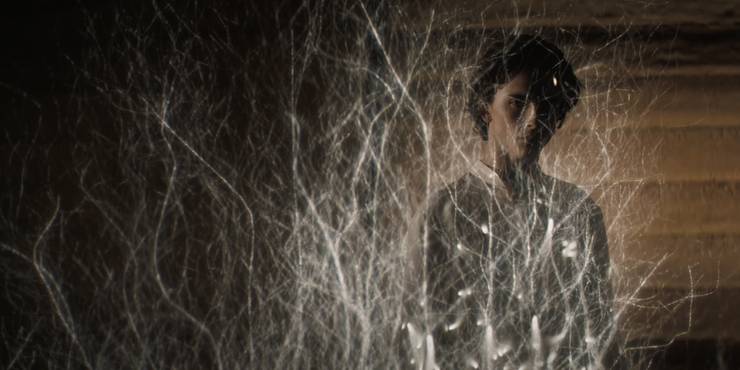Dune: 9 Things Only Book Readers Know About Paul Atreides

WARNING: This article contains spoilers for the novel Dune: Messiah
Denis Villeneuve’s adaptation of Dune received critical acclaim and is on track to become a commercial success. The movie stars Timothée Chalamet as Paul Atreides, a gifted young man, and heir to House Atreides who will play a crucial part in Arrakis’ liberation.
The movie does an admirable job adapting Frank Herbert’s notoriously unyielding source material, but there will always be things that get lost in translation. Indeed, Paul is fully-fledged and compelling on screen, but several things about his character didn’t make it to the movie and thus remain known only by the most loyal and attentive book readers.
He Draws Inspiration From Greek Mythology

Even though Dune takes place in the far distant future, it still drew inspiration from classic sources. Brian Herbert – Frank Herbert’s son and biographer – claimed that Dune‘s Atreides family was based on the mythical and ill-fated Atreus. In Greek mythology, Atreus was the King of Mycenae and the father of Agamemnon and Menelaus. Atreus’ myth is one of the darkest in Greek mythology. At one point, he cooks his nephews and feeds them to their father, his brother Thyestes.
Atreus meets his end at the hands of his adoptive son, Aegisthus, who’s the product of the incestuous affair between Thyestes and his daughter, Pelopia, conceived after an oracle told Thyestes that a son of his would eventually kill Atreus. Further misery befalls Atreus’ house after his two legitimate sons marry Clytemnestra and Helen, setting the stage for the most famous conflict in Greek mythology, the Trojan War.
He Received Early Mentat Training

At the start of Dune, Paul is quite the capable young man. He received basic Bene Gesserit training from his mother while also being schooled in weapon use and combat by Gurney Halleck and Duncan Idaho. However, Paul also secretly received the early Mentat trainer from Thufir Hawat.
The 2021 Dune leaves out several crucial aspects of the original novel, including the role and importance of Mentats. They are basically human computers who gained considerable abilities relating to cognition, memory, and calculation after intense mental and psychological conditioning. Mentats need to display a certain degree of cognitive ability even before training, confirming Paul’s state as an above-average human.
He Receives Two Names After Joining The Fremen

Dune ends with Paul and Jessica joining the Fremen tribe at Sietch Tabr, leaving several unanswered questions for the much-anticipated Dune sequel. In the book, Paul earns the Fremen’s trust and forms unique bonds with Stilgar and Chani. As part of his acceptance into the tribe, he receives a secret name known only to those at Sietch Tabr, Usul, meaning “the strength at the base of the pillar.”
Paul also chooses a common name of manhood to be used openly with all the Fremen. He settles for Muad’Dib, the kangaroo mouse of Arrakis, who had a brief but memorable scene in the 2021 movie. The name pleases the Fremen, who hold the mouse in high regard.
He Is The Kwisatz Haderach

Within the Bene Gesserit, the Kwisatz Haderach is a male superbeing, “the one who can be many places at once.” Herbert defines the Kwisatz Haderach as “The Shortening of the Way,” describing him as someone who has the knowledge of both his male and female ancestors, granting him prescience. Paul becomes the Kwistax Haderach after enduring the process of spice agony after consuming the Water of Life.
The Bene Gesserit, being all-female, could not access their genetic memory due to the lack of a Y chromosome. Therefore, the Kwisatz Haderach had to be a male, prompting them to initiate their genetic program, extending it across generations.
He Wasn’t Supposed To Be The Kwisatz Haderach

The Kwisatz Haderach is the Bene Gesserit’s ultimate goal. By the time Dune begins, they have been carefully engineering the messiah’s arrival, manipulating bloodlines across centuries, and collecting “key” genes. They anticipate that the Kwisatz Haderach will result from the union between an Atreides daughter and Feyd-Rautha, Baron Harkonnen’s nephew. Things go awry when Lady Jessica bores Paul out of love for Duke Leto instead of the daughter she was supposed to breed.
The Kwisatz Haderach’s arrival one generation early brings unbalance to the Bene Gesserit, setting up a chain of events that eventually puts their entire operation at risk. Dune doesn’t delve into the Bene Gesserit’s complex and rich lore, but fans expect to learn more about them in the upcoming Dune: The Sisterhood.
He Becomes Emperor

Dune ends with Shaddam IV’s abdication in favor of Paul. The sequel, Dune Messiah, begins twelve years into his reign. Now in complete control of his abilities as Kwisatz Haderach, Paul allows his jihad to kill sixty billion people across the universe because it’s still the best possible future, according to his visions.
Dune Messiah goes deeper into the series’ themes of messianism, fate, faith, and leadership. The Paul in Messiah is crushed by the blind devotion he inspires and the vision of a future he sees but doesn’t know how to stop. The sequel truly cements Paul as a tragic hero and a victim of his own doing.
An Assassination Attempt Blinds Him

Paul survives various assassination attempts throughout the series, including the ones shown in the 2021 movie adaptation. As Emperor, Paul becomes an en even bigger target. However, he is in genuine danger when a Fremen conspiracy forms around him. The attackers use a stone burner to kill him but fail and only succeed in destroying his eyes.
Now physically blind, Paul can still see using his prescience. However, the book’s events take a heavy toll on him, and he eventually loses his abilities. Recognizing the end of his journey, Paul leaves his newly born children under his sister’s care and walks into the desert to die alone, embracing Fremen tradition one last time.
He Is Similar To A Real-Life Figure

Movie and history lovers will be aware of T.E. Lawrence’s story. He was a British archeologist and army officer who gained notoriety during World War I. He is particularly renowned for his participation in the Sinai and Palestine Campaign of 1915 and the Arab Revolt of 1916. His successful tactics made him a hero among the Arabs, earning him international recognition as “Lawrence of Arabia.” His exploits later became a critically acclaimed motion picture, Lawrence of Arabia, starring Peter O’Toole.
Brian Herbert noted the similarities between both characters while writing the afterword for Dune. Like Lawrence, Paul leads a desert tribe to revolt against a cruel empire, eventually claiming victory and cementing himself as a hero of nearly messianic proportions.
He Is A Cautionary Tale

At first sight, Paul is a traditional hero and one of the bravest characters in Dune. He is well-behaved, honorable, courageous, and aware of his position as an agent of change. He’s also quite powerful, capable of using the Voice while being a skilled warrior.
However, Herbert makes sure to always underscore the tragedy of Paul’s life. He is a Duke in training who nearly ever expresses a desire to become Duke. Paul then becomes a God-like figure to the Fremen through his deeds but loses his individuality in the process. He is no longer seen as a man and instead becomes a vessel for the Fremen’s blind faith. Dune‘s primary message is a warning against placing absolute trust in a single leader. In a way, the novel advocates for mistrusting prototypical heroes, using Paul as a cautionary tale.
About The Author


















